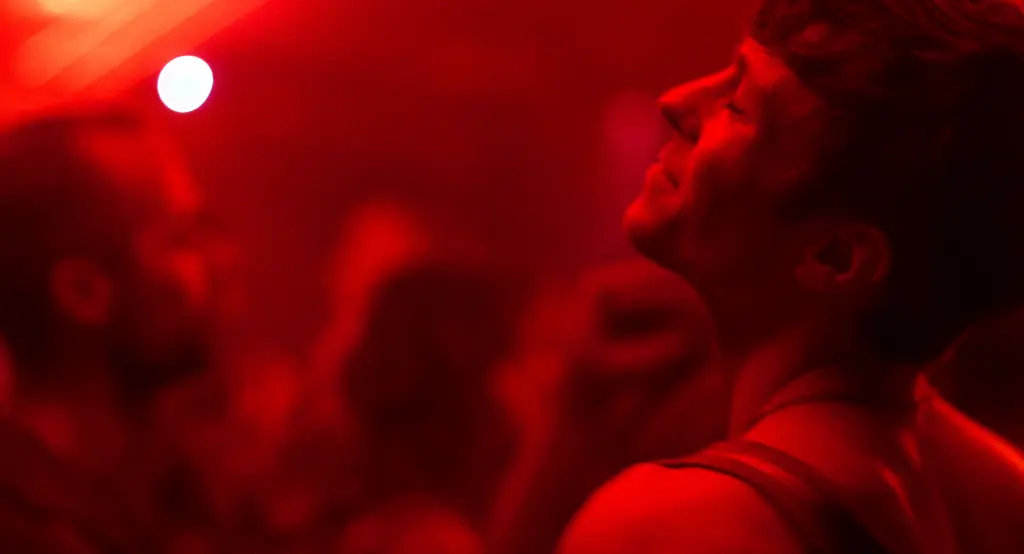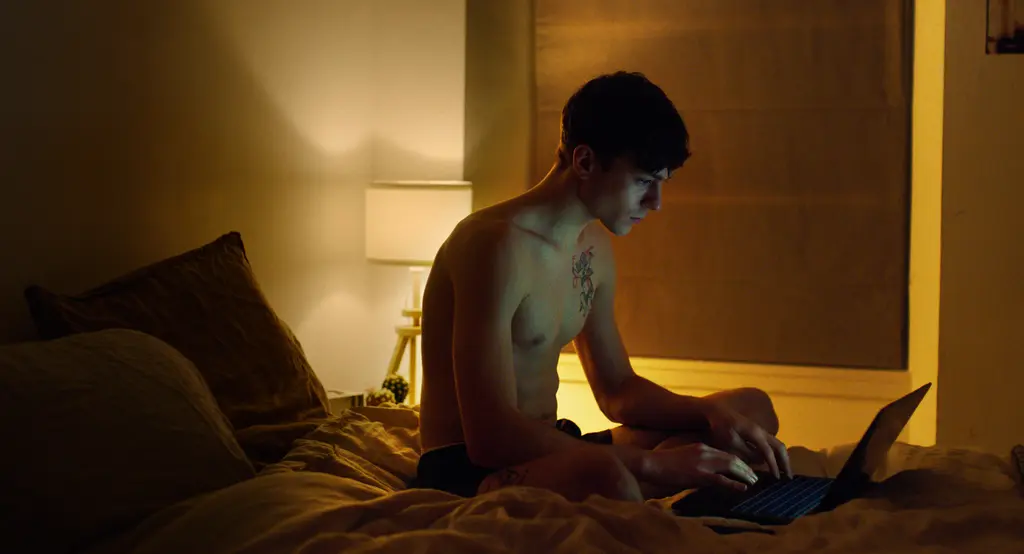Sebastian is a powerful depiction of queer desire

London Film Festival: Actor Ruaridh Mollica and director Mikko Mäkelä discuss this brilliant drama about a young novelist who moonlights as a sex worker – mining the latter to write his stories.
Culture
Words: Craig McLean
The breakout role in the breakout film at this year’s London Film Festival might just be Ruaridh Mollica in Sebastian.
As a newly minted leading man who’s in practically every scene, the Scottish-Italian, 25 next week, is a quiet revelation in writer-director Mikko Mäkelä’s feature. By day, Max, (Mollica) is a freelance contributor to a culture magazine who’s distracted by more literary aspirations: he’s had a short story published in Granta but is focused on writing his novel. By night, he’s Sebastian, a newcomer to hook-up app Dreamy Guys, who uses his experiences with clients as field research – the better to flesh out and authenticate the action in his fiction.
But, naturally, this seeking out of transactional sex doesn’t run smoothly. Max is told that the early drafts of his work are repetitive, a reflection of the fact that his alter-ego’s clients are all older men. So Sebastian decides to go deeper and wilder: a drug-induced orgy with a group of young lawyers? Sounds about right. His eyes, then, are now open to other experiences and to the truth of where he, as Max, derives pleasure.
The second feature (after 2017’s A Moment In The Reeds) from London-based Finnish filmmaker Mäkelä, 35, Sebastian is a powerful depiction of queer desire, the practical realities of sex work as, well, work, and of a young British actor who is a proper rising star.
Congratulations, Ruaridh and Mikko, on Sebastian. Last night was its LFF premiere, following the film’s unveiling at Sundance earlier this year. How was that?
Ruaridh: You’d think you’d get a little bit more comfortable with it. But everywhere you screen [it] is different. This was in London, and it’s a London film – last night my mum and twin sister were there! So it was the most nerve-wracking one. And it felt one of the most important.
Had you prepared them for all the nudity and sex?
R: Yeah, totally. I told my mum about the film when I was cast, so she knew what she was in for. But it must be such an interesting thing as a mother, or even my sister, to see the person that you’ve grown up with, or raised, in these situations. And obviously the character was from Edinburgh, and I’m from Edinburgh, and the accent’s the same. Most of my work has been in a different accent. So it must have been a really bizarre experience, and very close to home.
How did this story come about?
Mikko: Sex work has become really commonplace within London’s queer community, almost like just another option in the city’s gig economy, with so many students and recent graduates especially engaging in it in one way or another. Getting familiar with London’s queer scene following my move to the capital after university, I was struck by the sheer number of my peers who seemed to be doing sex work. Facilitated by the internet, even apps like Grindr, it’s never been easier for someone to dip their toes in sex work.
“Who has the right to tell whose stories? Do we need lived experience about a topic to be able to write about it authentically?”
Mikko Mäkelä
What kind of story did you want to tell?
Mikko: I wanted to craft a portrait of a character, a young queer guy in London, for whom sex work is a choice rather than the last resort that it’s too often been depicted as. I wanted to make a film that looks at what physical sex work that’s facilitated by online platforms looks like for a young gay man in London in 2024, in a frank but non-judgemental way. It was important to show sex work from a sex-positive perspective, as a valid choice, as something that can also be empowering. It doesn’t need to be seen as traumatising or something that’s pursued as a consequence of trauma.
Max feels he can only write authentically if he experiences the things he’s writing about. How did you research for the role?
R: The world that was hardest, that I wanted to understand the most, was actually the world of being a writer and literature and working in an office. Understanding the stakes and the pressure and the sacrifice of writing for magazines that, one minute, are like: “You’re a wonderful writer”, but the next minute are: “We think you’re terrible, and we’ve not got space for you anymore.” [Not at this magazine, mate – Reputational Ed.]
M: Researching for the screenplay, I found myself reflecting on my own creative process as a writer, and thinking about questions like: who has the right to tell whose stories? Do we need lived experience about a topic to be able to write about it authentically? Might a writer choose to live their life in a different, more interesting way, to have material for their work? Through Max’s story as a writer, I wanted to stage this broader examination of the nature of storytelling itself, especially in this day and age that places so much currency on authenticity of voice in fiction.
How much honest information about sex work is out there?
R: There’s a lot of really good interviews online and on YouTube. They’re talking to sex workers, or there’s a group of sex workers all talking to each other about their work and what it was like when they first told their family, or if they hadn’t. That was really important to highlight the lack of shame around it. And actually some people are really happy in their jobs as sex workers, love it and their families support them. Although obviously that’s not the case in every situation.


As well as being emotionally draining and gruelling, it must have been a physically tiring shoot – the sex scenes are fairly robust, shall we say.
R: Yeah! Oh my God, it was so, so, difficult. Part of me was like: “I’ve had sex before, it shouldn’t be that difficult…” But then you realise that actually you’re doing it 16 times, one after the other after the other. You’re exhausted!
Also, I’d never done scenes in the gym before. I was like: “Oh, well, I don’t want to look like I’m lifting the smallest weight. So I’ll do one that is [a bit heavier]…” But then by take three, you’re like: “I should have just picked a lighter weight!”
Last year I interviewed George Mackay and Nathan Stewart-Jarrett about their film Femme. They talked about their many sex scenes as being akin to stunt work.
R: In [some of] these scenes, it definitely did feel a little bit more like fight choreography. But the hardest part was selling it convincingly. Because these are moments where, if one person’s slightly not in it, or you’re slightly missing a beat, or you’re not there emotionally, or you’re really nervous, it shows. You really do have to completely lose yourself in it to sell it convincingly.
And that’s why I think intimacy co-ordinators are so important when it comes to cultivating that relationship with the other actor.
But it’s not all action. We learn as much from Max’s eyes in some scenes.
M: Ruaridh is a really precise actor who can say so much with very little and really communicate the slightest mental shifts and thoughts without words. Sebastian is a character study where we spend a lot of scenes quietly alone with Max, really studying his mind, and Ruaridh is such an engaging performer in those moments.
And what, in the end, did the leading man’s mum make of Sebastian?
R: She loved it! But I was absolutely terrified. Actually, I left the screening last night halfway through because I couldn’t stop watching it through my mum’s eyes. I was like: I just need to get out of the cinema and have a wee beer and have a chat and then get ready for the Q and A…
Sebastian screens again at LFF on 19th October, and will hit cinemas in February 2025



